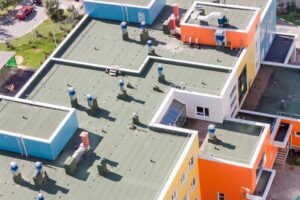
Commercial buildings in Collierville, Tennessee, often have flat roofs due to their practicality and versatility. Flat roofing systems offer numerous benefits for businesses, including space utilization, cost-effectiveness, and energy efficiency. However, understanding the key components, types of materials, and proper installation and maintenance processes is crucial to ensure the longevity and functionality of a flat roof. In this article, we will explore the various aspects of commercial flat roofing in Collierville, helping business owners make informed decisions for their properties.
Understanding Flat Roofing Systems
Flat roofing systems are different from their sloped counterparts, and they require unique considerations. One essential aspect of understanding flat roofing systems is familiarizing oneself with their key components.
When it comes to flat roofs, there are several crucial elements that make up the system:
- Roof Deck: The base layer that supports the entire roofing system. It is typically made of wood, concrete, or metal, providing a sturdy foundation for the roof.
- Insulation: Provides thermal efficiency and helps regulate the temperature inside the building. Proper insulation is crucial for energy efficiency and preventing heat loss.
- Membrane: The waterproof layer that protects the roof from external elements. It is usually made of materials like EPDM, TPO, PVC, or modified bitumen, providing a durable barrier against water infiltration.
- Flashing: Metal strips used to reinforce vulnerable areas, such as joints and edges. Flashing helps prevent leaks and ensures the integrity of the roof system.
- Drainage System: Essential for preventing water pooling and ensuring proper water flow. Flat roofs rely on an efficient drainage system, including gutters and downspouts, to channel water away from the roof surface.
Understanding these components is essential when considering the installation, maintenance, and repair of a flat roof. Each element plays a crucial role in the overall performance and longevity of the roofing system.
Types of Commercial Flat Roofs
There are several types of materials commonly used for commercial flat roofs in Collierville. Each material offers unique advantages and characteristics that cater to different needs and preferences.
EPDM Roofing: Ethylene Propylene Diene Monomer (EPDM) is a synthetic rubber material known for its durability and weather resistance. It is highly flexible, making it suitable for various roof shapes and sizes. EPDM roofs are also resistant to UV rays and can withstand extreme temperatures, making them an excellent choice for commercial buildings.
TPO and PVC Roofing: Thermoplastic Olefin (TPO) and Polyvinyl Chloride (PVC) are both single-ply membranes that provide excellent energy efficiency and resistance to chemicals and UV rays. These materials are lightweight, easy to install, and offer superior durability. TPO and PVC roofs are popular choices for commercial buildings due to their long lifespan and low maintenance requirements.
Modified Bitumen Roofing: This roofing system combines asphalt and modifiers to create a durable and flexible membrane, ideal for low-slope roofs. Modified bitumen roofs are known for their excellent resistance to extreme weather conditions, including high winds and heavy rainfall. They also offer superior waterproofing properties, making them a reliable choice for commercial flat roofs.
Considering the specific needs and requirements of a commercial building is crucial when choosing the right flat roofing material. Factors such as climate, budget, and building usage should be taken into account to ensure the best possible roofing solution.
Benefits of Flat Roofing for Commercial Buildings
Flat roofing offers several advantages that make it a popular choice for commercial buildings in Collierville.
When considering the benefits of flat roofing for commercial buildings, it’s important to delve deeper into the various aspects that make it a practical choice. One key advantage is the versatility of flat roofs, which allow for creative space utilization and accessibility. Beyond just providing a weatherproof covering, flat roofs offer additional usable space for commercial properties. This space can be transformed into rooftop gardens, outdoor seating areas for employees or customers, or even serve as a platform for the installation of solar panels to harness renewable energy. Furthermore, the flat surface of these roofs makes it easier to access HVAC systems, facilitating maintenance and repairs with greater convenience.
Space Utilization and Accessibility
Flat roofs provide additional usable space for commercial properties. This space can be utilized for rooftop gardens, outdoor seating areas, or even the installation of solar panels. Moreover, flat roofs make it easier to access HVAC systems, making maintenance and repairs more convenient.
Another significant advantage of flat roofing is its cost-effectiveness and energy efficiency. Flat roofs tend to be more cost-effective compared to sloped roofs because they require fewer materials and less labor for installation. This can result in savings for commercial property owners, especially when constructing or renovating large buildings. Additionally, flat roofs contribute to improved energy efficiency by providing better insulation. The even surface allows for more effective regulation of temperature within the building, reducing the need for excessive heating or cooling. This enhanced insulation not only creates a more comfortable indoor environment but also helps lower energy consumption and utility costs over time.
Cost-Effectiveness and Energy Efficiency
Flat roofs tend to be more cost-effective compared to sloped roofs because they require fewer materials and less labor for installation. Additionally, flat roofs allow for improved energy efficiency as they provide better insulation, which helps regulate temperature and reduces heating and cooling costs.
Choosing the Right Material for Your Flat Roof
When it comes to selecting the appropriate material for a commercial flat roof, there are several factors to consider.
EPDM Roofing
EPDM roofing is a popular choice for commercial flat roofs due to its longevity, easy installation, and resistance to ultraviolet rays and extreme weather conditions.
TPO and PVC Roofing
TPO and PVC roofing membranes offer excellent energy efficiency, chemical resistance, and ease of installation. They are particularly suitable for larger commercial buildings.
Modified Bitumen Roofing
Modified bitumen roofing provides enhanced durability and flexibility. It is an ideal choice for commercial buildings with low-slope roofs that require high-performance membranes.
Consulting with a professional roofing contractor can provide valuable insights into the best material for specific commercial roofing needs.
Installation and Maintenance of Flat Roofs
Proper installation and regular maintenance are essential for ensuring the longevity and functionality of commercial flat roofs.
Professional Installation Process
It is crucial to hire a professional roofing contractor experienced in flat roof installation. They will assess the building’s needs, prepare the roof deck, and install the chosen membrane and insulation materials correctly.
Regular Maintenance and Inspection
Maintaining a regular inspection and maintenance schedule is key to preventing potential issues and extending the lifespan of a flat roof. This includes cleaning debris, checking for cracks or leaks, and ensuring proper functioning of the drainage system.
Partnering with a reputable roofing company can provide business owners with peace of mind, knowing their flat roof is in good hands.
Common Challenges with Commercial Flat Roofs
While commercial flat roofs offer numerous benefits, they can also present specific challenges that need to be addressed.
Drainage Issues
Flat roofs rely heavily on a proper drainage system to prevent water pooling and potential damage. Ensuring the drains and gutters are clear of debris and regularly maintained is crucial to avoid drainage issues.
Weather-Related Damage
Extreme weather conditions, such as heavy rainfalls, hailstorms, or high winds, can damage flat roofs. Regular inspections and prompt repairs are essential to address weather-related damages promptly.
By understanding these challenges, business owners can take proactive steps to mitigate potential risks and ensure the longevity of their commercial flat roofs in Collierville.
In conclusion, commercial flat roofing systems offer several advantages for businesses in Collierville. Understanding the key components, types of materials, and proper installation and maintenance processes is vital to maximize these benefits. By choosing the right material, hiring professional contractors, and addressing common challenges, business owners can have durable, cost-effective, and energy-efficient flat roofs for their commercial properties in Collierville.
Ready to ensure your Collierville commercial property is equipped with a top-tier flat roofing system? Look no further than Commercial Roofing Rana. With our extensive experience serving the Mid-South since 1983, we specialize in providing industrial buildings, commercial stores, municipal structures, and more with the highest quality roofing services. Don’t let water damage threaten your business—our precision-engineered Duro-Last roofing systems offer the perfect fit and superior protection. Trust our licensed team of experts to deliver exceptional results that safeguard your employees, customers, and inventory. Whether you’re in Memphis, Jackson, Jonesboro, Tupelo, or the surrounding areas, Schedule Now with Commercial Roofing Rana and secure your property’s best defense against the elements.
